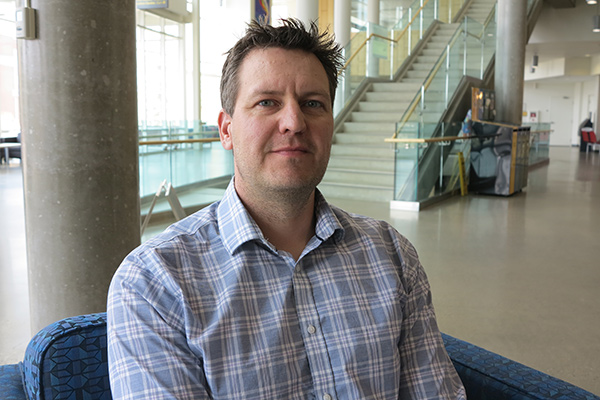New acting director of Alberta Centre for Sustainable Rural Communities looks to build relationships
Tia Lalani - 26 January 2021

Although adjunct professor Clark Banack began teaching full-time in Ontario after pursuing his PhD at the University of British Columbia, it was Camrose, Alberta where he decided what his future would look like.
“The year I spent at Augustana as an undergraduate student was really important in formalizing what I wanted to do,” he said. “It was there that I decided I wanted to be a professor. I also had some really good politics professors—Roger Epp and Tom Bateman—and their work really sparked my interest in politics around rural Alberta. Even though I was a rural Alberta kid, I hadn’t really thought too hard about those kinds of issues.”
As the newly appointed acting director of the Alberta Centre for Sustainable Rural Communities (ACSRC)—a joint initiative of the University of Alberta’s Augustana Campus and the North Campus Faculty of Agricultural, Life & Environmental Sciences that seeks to support resiliency in rural communities—Banack is excited to incite that passion in others by strengthening connections between the centre, Augustana campus students and the community.
“There are a lot of rural municipalities that have done good work with the ACSRC already,” Banack said. “I think there’s even more room to build connection, especially between rural Alberta citizens and the university. There are so many benefits that the university can bring to rural communities, which is a big part of what the centre has been doing, and can do more of.”
Continuing the Good Work
Banack also looks forward to continuing the excellent work that the centre’s inaugural director, Professor Lars Hallström, completed over his 11-year tenure before moving on to an opportunity at the University of Lethbridge’s Prentice Institute.
“Lars has been hugely successful in building up the centre in a number of ways: winning grants, training students, developing partnerships, completing projects with all number of rural communities out there,” Banack explained. “I’m looking forward to continuing in that direction, but at the same time, really taking these first few weeks as an opportunity to step back and reassess what the centre can be and what the centre can do. A lot of that is gathering feedback: from the centre’s executive council, reaching out to professor’s around Augustana and speaking to different stakeholders across rural Alberta.”
The ACSRC has been instrumental in providing research experience for a number of undergraduate students—including 54 students in the last five years alone. Banack hopes to further build on the centre’s role in adding to the education that students get at Augustana.
“So many of the students that come here are from rural Alberta or Saskatchewan, and I believe the type of work the centre does can be of real interest to them, whether they’re business students, science students or philosophy students. There are ways that we can contribute to their broader education, complementing what they’re already learning in class,” Banack said.
The Right Person for the Job
Banack’s passion and excitement, developed from his very own path and interest in rural politics, aren’t the only things that have well-prepared him for the role of acting director.
Along with teaching various political studies and political science courses—including courses on American politics, religion and politics and the politics of rural Alberta, all of which he developed and taught at Augustana—Banack has been a senior research associate with the centre for three years. His own research projects, which include using ethnography to better understand public opinion in rural Canada, making sense of the patchwork of provincial approaches to religious education in Canada and exploring ways to enhance inclusivity in rural communities also lend themselves to the work of the centre, as well as his passion for rural communities more broadly.
“It’s hugely exciting to take on the role of acting director of the centre,” Banack said. “As I said, I’m a rural Alberta kid. I’ve been thinking a lot—especially in the last ten years—about the politics of rural Alberta and the direction that rural Alberta is going in. This is an opportunity to really dive in, do some serious research and do even more connection-building between rural Alberta communities and the university.”